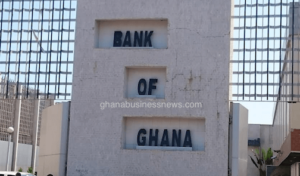Bank of Ghana cuts policy rate to 29%
 The Monetary Policy Committee (MPC) has cut the policy rate, the rate at which the Central Bank lend to commercial banks, by a 100-basis point, citing disinflation as the reason.
The Monetary Policy Committee (MPC) has cut the policy rate, the rate at which the Central Bank lend to commercial banks, by a 100-basis point, citing disinflation as the reason.
The reduction in the policy rate was announced by the Dr Ernest Addison, Governor, BoG, at the 116th Monetary Policy Committee (MPC) press briefing in Accra on Monday, January 29.
The Monetary policy rate is also an important tool to businesses, as it determines the interest rate on loans to businesses by commercial banks.
“Headline inflation declined sharply by more than 30 percentage points in the course of 2023,” he said.
Ghana’s inflation rate was 53.6 per cent in January 2023, but reduced to 23 per cent in December 2023.
Dr Addison explained that several factors had supported the disinflation process, including the tightening monetary policy stance throughout 2023, favourable international crude oil prices which led to stable ex-pump prices and transportation costs, and relative stability in the exchange rate.
“The latest forecast suggests that the disinflation process will continue, and headline inflation is expected to ease to around 13 and 17 per cent by the end of 2024, before gradually trending back to within the medium-term target range of 6-10 per cent by 2025,” he said.
The Governor, however, noted that there could be upside risks to the inflation outlook, hence, the need for strict implementation of the 2024 budget and a tight monetary policy stance to sustain the disinflation process.
On the banking sector, Dr Addison stated that bank’s liquidity and profitability positions had improved in the aftermath of the domestic debt restructuring.
“It is expected that early recapitalisation and effective risk management by banks will help promote overall banking sector stability and resilience and ensure effective financial intermediation to strengthen the economic recovery efforts,” he said.
Speaking about domestic macroeconomic conditions, he indicated that there had been gradual recovery in economic activity, due to the positive results of the International Monetary Fund (IMF) Extended Credit Facility (ECF) programme.
“Growth, however, remains below potential, requiring policy support, including help from the supply-side,” he said.
Source: GNA
